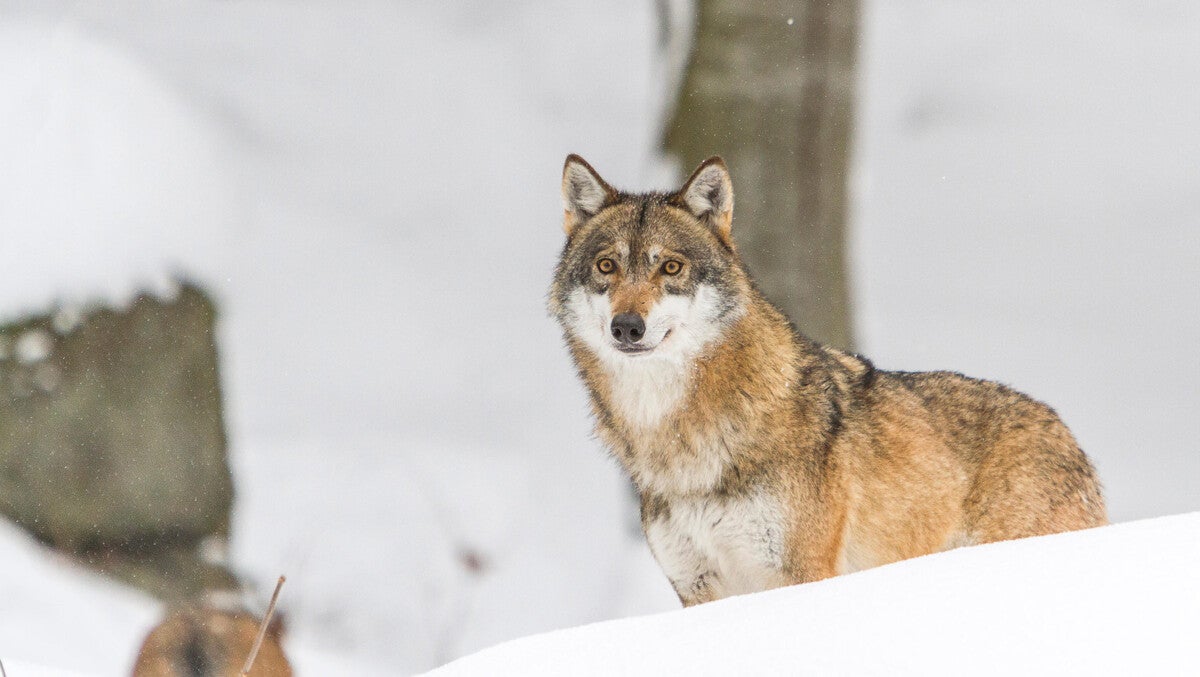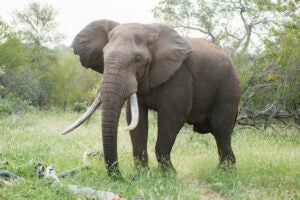Ask Ontario’s Solicitor General to safeguard the remaining animals at Marineland
Humane Society International / Canada
Humane Society International / Canada
Ask Ontario’s Solicitor General to safeguard the remaining animals at Marineland
Humane Society International / Canada
Urge the Canadian government to accelerate the phase-out of animal testing
Humane Society International / Canada
Help stop this cycle of cruelty by pledging to adopt your next pet or purchase only from a responsible breeder
Humane Society International / Canada
Humane Society International / Canada

OTTAWA, Ontario—Wolf Awareness, WeHowl, Animal Justice, the International Fund for Animal Welfare, Humane Society International/Canada and Animal Alliance of Canada are applauding a decision by Health Canada’s Pest Management Regulatory Agency to cease the use of the poison strychnine for killing wild animals, including wolves, coyotes and black bears.
The decision to cancel the registration of products containing this dangerous poison follows years of advocacy and campaigning, including a request for special review of strychnine and other predacides filed by a coalition of groups in December 2020. Today’s decision reverses the PMRA’s initial proposal in August 2022 to allow the continued use of both strychnine and Compound 1080. That proposed decision was widely condemned by animal protection and conservation groups because of the cruel nature of these indiscriminate poisons and the serious harm that they cause to the environment.
Strychnine is notorious for causing some of the most agonizing symptoms of any poison, including muscular convulsions that can last up to 24 hours or longer before an animal finally succumbs to exhaustion or suffocation. Due to its gruesome nature, it featured prominently in Agatha Christie murder mystery novels.
In addition to the unnecessary pain the poison inflicts on its intended targets, it is known to recklessly kill hundreds of non-target animals each year, including companion dogs, birds of prey and endangered species. These animals suffer and die after consuming poison baits or from consuming the bodies of other poisoned animals.
“This decision is a huge victory for wild animals across Canada,” said Kaitlyn Mitchell, director of legal advocacy with Animal Justice. “Strychnine is among the most gruesome poisons in existence. We are thrilled that animals will no longer endure the agony of strychnine poisoning on the Canadian landscape.”
“Strychnine not only kills the intended wolves, coyotes, black bears and skunks,” said Hannah Barron, conservation director with Wolf Awareness. “It also kills countless other animals unintentionally, including golden eagles, lynx, ravens, grizzly bears and companion dogs, to name a few. Getting rid of this indiscriminate poison gets Canada one step closer to meeting its biodiversity targets under the Kunming-Montreal Global Biodiversity Framework.”
“There is a growing body of scientific evidence showing that lethal removal of large carnivores, including through poisoning, is not an effective way to reduce predation on livestock,” said Sadie Parr, organizer of WeHowl. “There are more effective ways to prevent conflicts, which are also more ethical and environmentally responsible. Many Canadians are already using such methods with success.”
“Canada’s use of strychnine to kill wildlife is an issue that attracted the attention of hundreds of thousands of concerned citizens in Canada and beyond. We are thrilled that Health Canada has reversed their previous decision, and finally canceled all uses of strychnine” said Sheryl Fink, director of Canadian wildlife issues with IFAW.
“I want to thank the Minister of Health and the folks at the Pest Management Regulatory Agency for banning the use of strychnine in Canada,” said Liz White, director of Animal Alliance of Canada. “No longer will this predacide be spread on the landscape indiscriminately killing wolves, coyotes and many other wild animals.”
“We are thrilled with Health Canada’s decision to ban this deplorable poison, which has no place in wildlife management,” said Kelly Butler, wildlife campaign manager at Humane Society International/Canada. “This ban will spare so many animals from horrific, prolonged and needless deaths and we commend the government for taking this step towards improving welfare outcomes for wildlife and removing poisons from Canada’s ecosystems.”
While the animal protection and environmental groups are relieved following PMRA’s decision to end the use of strychnine by September, it remains urgent for the PMRA to also ban Compound 1080, another poison also used to kill wolves and coyotes. It causes vomiting, convulsions, intense pain and hallucinations to animals who ingest it, and is unacceptably cruel.
Similar to strychnine, the effects of Compound 1080 can last hours or even days before an animal dies from cardiac failure or respiratory arrest.
According to a national Environics poll commissioned by Wolf Awareness, Animal Alliance and Animal Justice, 69% of Canadians say that the risks posed by strychnine and Compound 1080 used in Canadian wildlife management programs are unacceptable.
-30-
Media Contacts:
Sadie Parr
Wolf researcher/advocate and Organizer of WeHowl
250-272-4695
Hannah Barron
Conservation Director, Wolf Awareness
647-567-8337
Kaitlyn Mitchell
Director of Legal Advocacy, Animal Justice
647-764-8702
Sheryl Fink
Director, Canadian Wildlife Campaigns. IFAW Canada
519-830-0046
Kelly Butler
Wildlife Campaign Manager, Humane Society International/Canada
514 914-7607
Humane Society International / Canada
Prevent animals from suffering needlessly for human entertainment
Humane Society International / Canada

OTTAWA, Ontario—The Canadian government has banned domestic trade in elephant ivory and rhino horn, as well as the import of hunting trophies containing these parts. The landmark measures fulfill a 2021 Ministerial mandate and are a critical step in protecting these iconic species. The move follows a seven-year campaign by Humane Society International/Canada and has overwhelming support from leading conservationists, animal protection groups, African nations and notable Canadians.
The African elephant population has declined by 96% over the last century, with scientists warning that they, as well as many rhinoceros species, could become extinct within the next few decades in the absence of global intervention to disincentivize poachers.
Those involved in the decision issue the following statements:
Steven Guilbeault, minister of Environment and Climate Change Canada, said: “Our government is committed to protecting, conserving and enhancing the world’s biodiversity, including reversing the global decline in elephant and rhinoceros populations. By strengthening Canada’s response to wildlife trafficking, we will enforce practical solutions that effectively address the illegal ivory trade and support species conservation. Canadians overwhelmingly support stricter controls and the Government of Canada is delivering.”
Kelly Butler, campaign manager for Humane Society International/Canada, stated: “Elephant and rhino populations have been decimated by global trade in their parts, and poaching causes considerable suffering to these incredible animals. In banning trade in elephant ivory and rhino horn, the Canadian government has shown considerable leadership and reflected the will of Canadians and the vast majority of African nations holding elephant populations. At last, Canadians can rest assured that our country is doing our part to ensure these majestic animals have a future.”
Dr. Winnie Kiiru, Kenyan biologist and leading elephant conservationist, said: “I am thrilled that Canada has enacted these urgently needed regulations in order to safeguard elephant and rhino populations. As a conservationist working on the ground in Kenya, I have seen firsthand the devastating effects of poaching and trophy hunting on African elephant and rhino populations. We need countries around the world to act now in order to protect these amazing animals, and Canada’s actions send an important message: ivory belongs to elephants.”
Dieudonné Yameogo, director of Wildlife and Game resources of Burkina Faso, stated: “Burkina Faso congratulates Canada on this historic decision. Canada follows in the footsteps of other countries, such as the USA, China, Hong Kong SAR and the EU, which have all closed or severely restricted their domestic ivory markets in recent years. This sends a very strong message to all traffickers and poachers: ivory has no market value, anywhere in the world! These measures taken by these various countries could lead to a significant drop in illegal elephant killings in all African elephant range states, and particularly in Burkina Faso.”
Bryan Adams, order of Canada recipient and one of the best-selling musicians of all time, stated: “As a long-time animal advocate, I am thrilled that Canada has listened to the overwhelming number of Canadians who demanded action to end the senseless killing of elephants and rhinos. The policies enacted by the Canadian government set a powerful precedent for countries around the world to join the fight to protect elephants and rhinos.”
Robert Bateman, renowned Canadian artist and conservationist, stated: “I have had the great privilege of observing wild African elephants and, like so many other Canadians, I am devastated by the prospect of their extinction and their ongoing suffering at the hands of humans. The survival of African elephants and rhinos hinges on the actions of the global community, and I commend Canada for enacting meaningful policies to safeguard these amazing animals for generations to come.”
The creators of The Anthropocene Project (Edward Burtynsky, Jennifer Baichwal and Nicholas de Pencier), who documented the largest elephant ivory burn in history, which took place in Kenya in 2016, stated: “The poaching of elephants for ivory—from which international criminal syndicates profit—and the ensuing decimation of African elephant populations is tragic. Witnessing Kenya’s ivory burn was a very powerful moment for all of us and a shocking reminder of the scale at which elephants are being slaughtered, day after day, year after year. We commend the Canadian government for ending its role in this terrible, destructive industry which perpetuates the devastation of elephant and rhino populations.”
Fran Duthie, president of Elephanatics, stated: “The team at Elephanatics is thrilled that regulations to ban the elephant ivory and rhino horn trade, along with the import of hunting trophies containing these parts, are to be enacted by the Canadian Government. We would like to thank all the scientists, NGOs, politicians and people who worked tirelessly to make this happen. From the petition created by the Ivory Free Canada coalition that reached over 700,000 signatures and showed overwhelming support to save elephants and rhinos, to endless advocacy, to the collaboration of like minds working together to save a species, our mission to ban the elephant ivory and rhino horn trade has come to fruition. It is a time to be grateful and to celebrate this grand achievement. We did it!”
Facts:
ENDS
Media contact: HSI/Canada: Dominique Davidson, senior communications officer: ddavidson@hsi.org, 438-951-0350
Humane Society International / Canada
Urge Canada to pass Bill C-355 and stop allowing thousands of live horses to be flown to Japan to be slaughtered for meat
Humane Society International / Global
Urge Canada to stop allowing thousands of live horses to be flown to Japan to be slaughtered for meat
Humane Society International / Canada
An “ag-gag” bill would make it hard to expose cruelty to animals on farms